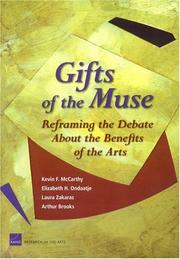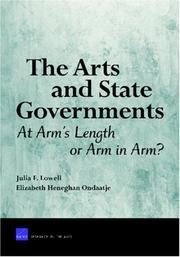| Listing 1 - 10 of 12 | << page >> |
Sort by
|

ISBN: 0833036947 0833040626 1598753703 9780833040626 9781598753707 9780833036940 Year: 2004 Publisher: Santa Monica, CA RAND Research in the Arts
Abstract | Keywords | Export | Availability | Bookmark
 Loading...
Loading...Choose an application
- Reference Manager
- EndNote
- RefWorks (Direct export to RefWorks)
During the past decade, arts advocates have relied on an instrumental approach to the benefits of the arts in arguing for support of the arts. This report evaluates these arguments and asserts that a new approach is needed. This new approach offers a more comprehensive view of how the arts create private and public value, underscores the importance of the arts' intrinsic benefits, and links the creation of benefits to arts involvement.
Government aid to the arts. --- Government patronage of the arts --- Arts and society. --- Arts --- Arts and sociology --- Society and the arts --- Sociology and the arts --- Social aspects --- Government aid --- Finance --- Didactics of the arts --- kunstopvoeding --- cultureel erfgoed
Book
ISBN: 1783200480 1841505471 1461928427 Year: 2012 Publisher: Bristol, UK ; Chicago, USA : Intellect Ltd,
Abstract | Keywords | Export | Availability | Bookmark
 Loading...
Loading...Choose an application
- Reference Manager
- EndNote
- RefWorks (Direct export to RefWorks)
Commercial theatre is thriving across Europe, while public theatre has suffered under changing patterns of cultural consumption - as well as sharp reductions in government subsidies for the arts. At a time when the rationale behind these subsidies is being widely reexamined, it has never been more important for public theatre to demonstrate its continued merit. In Resetting the Stage, Dragan Klaic argues convincingly that, in an increasingly crowded market of cultural goods, public theatre is best served not by imitating its much larger commercial counterpart, but by asserting its artistic dis
Theater and society. --- Government aid to the arts --- Arts --- Government patronage of the arts --- Actors --- Society and theater --- Theater --- Government aid --- Social status --- Social aspects --- Finance --- European theatre --- public theatre --- theatre market --- commercial theatre
Multi
ISBN: 9780521112741 9780521130172 9780511760341 9780511932854 0511932855 9780511927669 0511927665 9780511922442 0511922442 9780511852695 051185269X 0511760345 9786612917462 6612917466 9780511930171 0511930178 0521112745 0521130174 1107212634 1282917463 0511931514 0511925123 Year: 2011 Publisher: Cambridge Cambridge University Press
Abstract | Keywords | Export | Availability | Bookmark
 Loading...
Loading...Choose an application
- Reference Manager
- EndNote
- RefWorks (Direct export to RefWorks)
This book examines fundamental questions about funding for the arts: why should governments provide funding for the arts? What do the arts contribute to daily life? Do artists and their publics have a social responsibility? Challenging questionable assumptions about the state, the arts and a democratic society, Lambert Zuidervaart presents a vigorous case for government funding, based on crucial contributions the arts make to civil society. He argues that the arts contribute to democratic communication and a social economy, fostering the critical and creative dialogue that a democratic society needs. Informed by the author's experience leading a non-profit arts organisation as well as his expertise in the arts, humanities and social sciences, this book proposes an entirely new conception of the public role of art with wide-ranging implications for education, politics and cultural policy.
Political sociology --- Art --- Sociology of culture --- Arts and society. --- Democracy and the arts. --- Government aid to the arts. --- Arts --- Government patronage of the arts --- Arts and democracy --- Arts and sociology --- Society and the arts --- Sociology and the arts --- Government aid --- Finance --- Social aspects --- Relational art. --- Relational aesthetics --- Relationism in art --- Art, Modern --- Arts and Humanities --- Philosophy
Book
ISBN: 1282033328 9786612033322 0833046594 0833045776 9780833046598 9781282033320 9780833045775 6612033320 Year: 2008 Publisher: Santa Monica, CA Rand
Abstract | Keywords | Export | Availability | Bookmark
 Loading...
Loading...Choose an application
- Reference Manager
- EndNote
- RefWorks (Direct export to RefWorks)
Projects what the future likely holds for state arts agencies and for state arts policy if current trends and current strategies for addressing economic, political, and demographic challenges continue.
Art commissions -- United States. --- Government aid to the arts -- United States. --- U.S. states -- Cultural policy. --- Government aid to the arts --- Art commissions --- U.S. states --- Fine Arts - General --- Art, Architecture & Applied Arts --- Cultural policy --- Cultural policy. --- Commissions, Art --- State arts agencies --- Arts --- Government patronage of the arts --- Government aid --- Art, Municipal --- Art and state --- Education and state --- Finance
Book
ISBN: 9780773552678 0773552677 9780773551626 Year: 2017 Publisher: Montreal
Abstract | Keywords | Export | Availability | Bookmark
 Loading...
Loading...Choose an application
- Reference Manager
- EndNote
- RefWorks (Direct export to RefWorks)
Le Conseil des arts du Canada est le plus important organisme subventionnaire au pays pour les artistes et les organismes artistiques. Ce sont non seulement les écrivains, les praticiens des arts visuels, les interprètes et les musiciens qui en bénéficient, mais aussi l’ensemble de la culture au Canada. Dans Les fondements de la culture, le pouvoir de l’art, Monica Gattinger relate l’histoire du Conseil en rappelant l’élan à l’origine de sa fondation et en présentant le débat au fil des ans à propos de ses objectifs et de son incidence. Retraçant l’évolution graduelle du Conseil, depuis la priorité que l’organisme a accordé au soutien à l'offre artistique et à l'établissement de la culture et des arts au Canada, jusqu’à son intérêt élargi pour le pouvoir des arts au sein de la société, Gattinger décrit la façon dont ses dirigeants ont maîtrisé les tensions fondamentales inhérentes aux activités du Conseil. Elle étudie les arguments pour et contre « l’art pour l’art » et la poursuite d'objectifs économiques et sociaux plus larges par le biais des arts, les éventuels conflits politiques entre le fait de servir les besoins de la communauté artistique et ceux de la société canadienne, entre « leadership » et « followership », entre autonomie et collaboration, et entre les pratiques artistiques émergentes et les pratiques établies. Alliant la vivacité du récit et la profondeur de l’analyse, magnifiquement illustré par des dizaines de photographies des œuvres d’art, des personnes et des événements qui ont marqué l’organisme au fil des ans, Les fondements de la culture, le pouvoir de l’art constitue une lecture essentielle pour ceux et celles qui s’intéressent aux arts, à la culture et à la politique culturelle du Canada.
Government aid to the arts --- Art and state --- Art and society --- Art --- Art and sociology --- Society and art --- Sociology and art --- Arts --- Politics and art --- State and art --- Cultural policy --- Education and state --- Government patronage of the arts --- History. --- Social aspects --- Government policy --- Government aid --- Finance --- Canada Council for the Arts --- Canada. --- Conseil des arts du Canada --- Canada Council
Multi
ISBN: 9058501140 Year: 2005 Publisher: Nijmegen Wolf Legal
Abstract | Keywords | Export | Availability | Bookmark
 Loading...
Loading...Choose an application
- Reference Manager
- EndNote
- RefWorks (Direct export to RefWorks)
Art --- Economic policy and planning (general) --- Netherlands --- 351.852 <492> --- Overheidstaken, administratieve maatregelen i.v.m. musea, verzamelingen, bibliotheken, archieven--Nederland --- Cultural policy --- Government aid to the arts. --- Tax incentives. --- Economic aspects --- Government aid to the arts --- Tax incentives --- Intellectual life --- State encouragement of science, literature, and art --- Culture --- Popular culture --- Incentives, Tax --- Tax subsidies --- Taxation --- Tax expenditures --- Arts --- Government patronage of the arts --- Government policy --- Government aid --- Finance
Book
ISBN: 0833080407 0833080423 0833080369 9780833080424 9780833080400 9780833080417 0833080415 9780833080363 Year: 2013 Publisher: Santa Monica, CA : RAND,
Abstract | Keywords | Export | Availability | Bookmark
 Loading...
Loading...Choose an application
- Reference Manager
- EndNote
- RefWorks (Direct export to RefWorks)
Regional artists can play a positive role in shaping public debate and supporting democratic transition in the Middle East. This report explores the challenges artists have faced since the Arab uprisings, U.S. government programs to support arts in the region, and the wide array of nongovernmental activities to engage Arab artists, offering recommendations to improve support for these artists.
Arts --- Arts and society --- Arab Spring, 2010 --- -Art patronage --- Government aid to the arts --- Art, Architecture & Applied Arts --- Fine Arts - General --- History --- Political aspects --- Government patronage of the arts --- Arts, Fine --- Arts, Occidental --- Arts, Western --- Fine arts --- Arts and sociology --- Society and the arts --- Sociology and the arts --- Arts patronage --- Business patronage of the arts --- Corporations --- Maecenatism --- Patronage of art --- Arab Awakening, 2010 --- -History --- Government aid --- Social aspects --- Art patronage --- Humanities --- Art and industry --- Finance --- -Arts --- -Arts, Fine --- Arts, Primitive

ISBN: 9780300108903 Year: 2007 Publisher: New Haven, CT ; London Paul Mellon Centre for studies in British Art Yale University Press
Abstract | Keywords | Export | Availability | Bookmark
 Loading...
Loading...Choose an application
- Reference Manager
- EndNote
- RefWorks (Direct export to RefWorks)
Wereldoorlog II --- War Artists' Advisory Committee (WAAC) --- geschiedenis --- oorlog --- nationalisme --- vrouwen --- Clark, Kenneth --- 1939 - 1945 --- 20ste eeuw --- Groot-Brittannië --- 942.083 <084> --- Geschiedenis van Engeland--(1919-1945)--Illustraties; foto's; kaarten; portretten --- Government aid to the arts --- Modernism (Art) --- Nationalism and art --- World War, 1939-1945 --- Art, Modernist --- Modern art --- Modernism in art --- Modernist art --- Aesthetic movement (Art) --- Art, Modern --- Arts --- Government patronage of the arts --- World War, 1939-1945, in art --- Art and nationalism --- Art --- History --- Government aid --- Finance --- Great Britain. --- WAAC --- vrouw --- Wereldoorlog II. --- War Artists' Advisory Committee (WAAC). --- geschiedenis. --- oorlog. --- nationalisme. --- vrouw. --- Clark, Kenneth. --- 1939 - 1945. --- 20ste eeuw. --- Groot-Brittannië.
Book
ISBN: 2110046368 9782110046369 Year: 2000 Publisher: Paris (3, rue de Valois 75001) : DEPS,
Abstract | Keywords | Export | Availability | Bookmark
 Loading...
Loading...Choose an application
- Reference Manager
- EndNote
- RefWorks (Direct export to RefWorks)
Depuis les années 70, les artistes de toutes disciplines – comédiens, danseurs, musiciens, plasticiens, artistes de cirque – sont de plus en plus nombreux à travailler « en rue ». Près d'un millier de compagnies ont aujourd'hui fait, en France, le choix de l'espace public. Corollaire de cet essor, les « manifestations » festivals de rue et autres temps forts, se comptent aujourd'hui par centaines. Nébuleuse ou archipel d'une extrême hétérogénéité, les « arts de la rue » forment pourtant un secteur singulier, en pleine effervescence, qu'unit et gouverne une logique économique d'ensemble. Conduite auprès d'un échantillon représentatif de compagnies travaillant en rue (exclusivement ou partiellement) et d'organisateurs de manifestations de rue, la présente étude met en évidence les caractéristiques communes du domaine (économie fondée sur la vente, la solidarité, l'adaptabilité, mais aussi une certaine précarité), et les modèles économiques qui orientent les stratégies des acteurs (la grande troupe, la « petite entreprise familiale », le travail en solitaire). Elle examine aussi les effets qu'exercent sur la vie des compagnies des politiques publiques aux ambitions souvent contradictoires, incluant pêle-mêle soutien à la création, lutte contre l'exclusion, animation festive ou encore promotion touristique des villes.
Arts --- Economic aspects --- Sociological aspects --- Aspect économique --- Aspect sociologique --- Festivals --- -Government aid to the arts --- -Street art --- -Street musicians --- -Street theater --- Frankrijk --- 620 Kunst --- Theater --- Street music and musicians --- Musicians --- Street entertainers --- Art, Street --- Art, Wall --- Wall art --- Art and society --- Mural painting and decoration --- Performance art --- Politics in art --- Graffiti --- Government patronage of the arts --- Days --- Manners and customs --- Anniversaries --- Fasts and feasts --- Pageants --- Processions --- -Economic conditions --- -Government aid --- Finance --- -Festivals --- Aspect économique --- Government aid to the arts --- Street art --- Street musicians --- Street theater --- Economic conditions --- Government aid --- Sociological aspects. --- Socio economy of arts. --- Street theater. --- Economic conditions. --- Spectacles de rue --- France --- 1990-....

ISBN: 0833038672 0833040871 1433709570 9780833040879 9781433709579 9780833040848 0833040847 9780833038678 0833038249 9780833038241 0833040812 9780833040817 Year: 2006 Publisher: Santa Monica, CA RAND Corp.
Abstract | Keywords | Export | Availability | Bookmark
 Loading...
Loading...Choose an application
- Reference Manager
- EndNote
- RefWorks (Direct export to RefWorks)
State government spending on the arts is minimal-and may be losing ground relative to other state expenditures. The authors examine efforts made by state arts agencies to address a changing political and fiscal environment and present their findings on the risks and rewards of bringing the arts and politics closer together. This volume is the second in a series that covers the findings of a multiyear study of the changing roles and missions of state arts agencies.
Art commissions. --- Government aid to the arts. --- Government aid to the arts - United States - Case studies. --- U.S. states. --- Government aid to the arts --- Art commissions --- U.S. states --- Commissions, Art --- State arts agencies --- Government patronage of the arts --- Edison Schools Inc. --- Privatization in education -- United States -- Evaluation. --- School management and organization -- United States -- Evaluation. --- Privatization of education --- Privatization of schooling --- School privatization --- Edison Schools (Firm) --- Privatization in education --- School management and organization --- Evaluation. --- Educational administration --- Inspection of schools --- School administration --- School inspection --- School operation policies --- School organization --- Schools --- Educational planning --- Management --- Education --- Charter schools --- Inspection --- Management and organization --- Art, Municipal --- Art and state --- Education and state --- Arts --- Cultural policy. --- Government aid --- Finance --- Administration, Educational --- Operation policies, School --- Policies, School operation --- Organization
| Listing 1 - 10 of 12 | << page >> |
Sort by
|

 Search
Search Feedback
Feedback About UniCat
About UniCat  Help
Help News
News